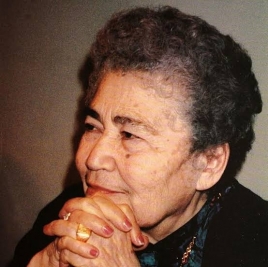Silva Kaputikyan
Tuesday, January 20, 2026
Silva Kaputikyan was an Armenian poet and political activist.
One of the best-known Armenian writers of the twentieth century, she is recognized as "the leading poetess of Armenia" and "the grand lady of twentieth century Armenian poetry". Although a member of the Communist Party, she was a noted advocate of Armenian national causes.
Her first collection of poems were published in the mid-1940s. By the 1950s she had established herself as a significant literary figure in Soviet Armenia. Besides Armenian she also wrote in Russian and many of her works were translated to other languages. In the later Soviet period she frequently addressed political and other issues.
Born Sirvard Kaputikyan on 20 January 1919 to parents from the historically Armenian-populated city of Van (in the historic Western Armenia, present-day Turkey), she was raised in Yerevan, the capital city of Armenia. Her father, Barunak, was a member of the nationalist Dashnaktsutyun party and died of cholera three months before her birth. She was raised by her mother and grandmother. She attended the Faculty of Armenian Philology Yerevan State University from 1936 and graduated in 1941, and subsequently studied at the Gorky Institute of World Literature of the Soviet Academy of Sciences from 1949 to 1950. She joined the Communist Party of the Soviet Union in 1945.
She made her literary debut in the early 1930s and published her first poem in 1933. In 1941 she became a member of the Writers Union of Armenia. Her first major publication, a collection of poems, appeared in 1945. Two main themes of her works were the national identity and lyric poetry. Her well-known poem, "A word to my son", became a "standard verse in asserting national identity". The last verse goes: "Look, my son, wherever you are, / Wherever you go under this moon, / Even if you forget your mother, / Do not forget your Mother tongue."
In 1962–3 and 1973 she traveled throughout Armenian diaspora communities in the Middle East (Lebanon, Syria, Egypt) and North America (United States and Canada). In 1964 and 1976 she published two travel books, which are accounts of her visits to the Armenian communities of the Middle East, largely composed of genocide survivors and their descendants, and North America. Her books of the 1960s and the 1970s focused on the history of the Armenian people and their future, which she always depicted in optimistic pictures. She wrote several poems for children and two dramas (1961–2, 1976).
In total, she authored over sixty books in Armenian and some in Russian. Her works were translated by Bulat Okudjava, Yunna Morits, Yevgeny Yevtushenko, Andrei Voznesensky, Bella Akhmadulina, and others.
Kaputikyan was married to the well-known poet Hovhannes Shiraz. Their only son, Ara Shiraz (1941–2014), was a prominent sculptor. According to Vanand Shiraz, Shiraz's son from a later marriage, they split up because "the presence of two personalities in one family is difficult." Writer and art critic Levon Mutafyan expressed a similar view: "Hovhannes Shiraz and Silva Kaputikyan divorced later because it seemed as though the two powerful individuals couldn't live together, but Ara served as the bridge that linked them."





